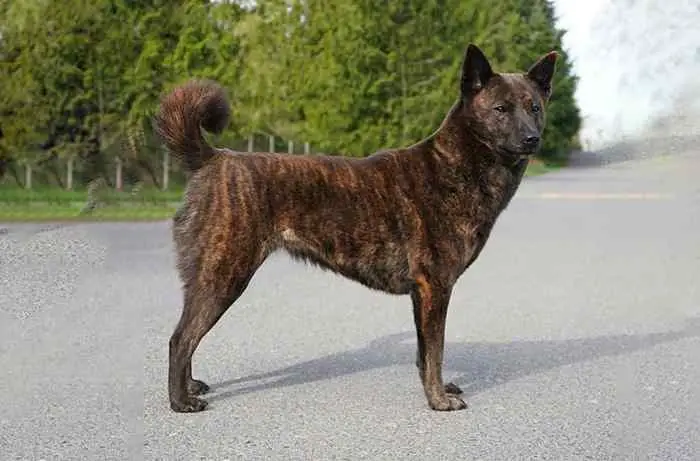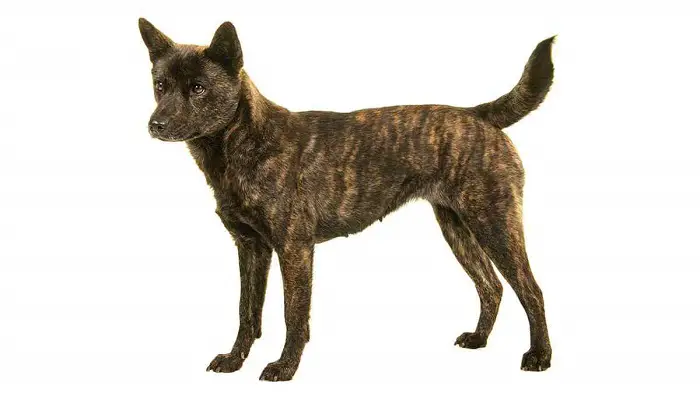The Kai-Ken is a friendly, intelligent dog breed that originated in Japan. The dog was once considered too primitive to serve as a family pet. But although Kais may be reserved with strangers, they are loyal, affectionate, and devoted to their families. The alternative name of the dog is Kai Tora-Ken, Tora (tiger), or Kai-Ken.
Kai-Ken is an overall healthy dog, and they need proper exercise. The dog are natural hunters and make good watchdogs. This article gives you a clear idea that is very interesting for a Kai-Ken lover. So, please stick with us and Keep reading!
History and Origin: Kai-Ken
The Kai-Ken is an ancient Japanese breed developed as a hunting dog on the island of Honshu in the province of Kai-Ken. There, it was used as a hunter of deer and boar.
The breed was kept pure due to its isolation. It was not recognized in Japan until 1934 and is still relatively rare.
Physical Description of Kai-Ken Dog
The Kai is a sturdy, medium-sized dog that resembles other Japanese spitz dogs. It has a broad, wedge-shaped head; a black nose; and small, triangular, dark brown eyes.
The large prick ears are triangular, and the tail curls over the back. It is double-coated with a thick, soft undercoat and a harsh, straight outer coat. It can be black brindle, red brindle, or dark brindle. It sometimes has white on the legs, chest, and belly.
Height, Weight, and Lifespan Kai Dog of Japan
- The average height of the Kai-Ken dog breed is about 17.5 to 22 inches (40-55 cm).
- The dog’s average weight is about 25 to 55 pounds (10-22 kg).
- The average lifespan of the Kai dog is about 12 to 15 years.
Temperament or Personality of Kai-Ken
The Kai is a courageous hunter with a strong prey drive but is gentle and devoted to their family. It’s wary of strangers but not aggressive and gets along well with other dogs. It is known for its ability to climb trees.
Besi Ownership: Kai Tora-Ken
The Kai requires an experienced active owner in the suburbs or country.
Special Needs of Kai Dog
The Kai Dog, also known as the Kai Ken, is a rare and ancient Japanese breed known for its loyalty, courage, and intelligence. Like any other breed, Kai Dogs have special needs to keep them happy, healthy, and well-behaved. Here are some of the unique needs of Kai Dogs:
- Exercise: Kai Dogs are active and energetic, requiring plenty of exercise to keep them physically and mentally fit. They enjoy long walks, hikes, and runs and are good at agility, obedience, and tracking.
- Socialization: Kai Dogs are naturally independent but also need early socialization to help them become well-rounded and adaptable dogs. This involves exposing them to various people, environments, and animals in a positive and controlled manner.
- Training: Kai Dogs are intelligent and eager to please, but they can sometimes be strong-willed and stubborn. They need firm and consistent training based on positive reinforcement techniques to help them learn good manners and obedience.
- Grooming: Kai Dogs have a thick, double coat that requires regular grooming to keep them clean and healthy. They shed moderately throughout the year and heavily during seasonal changes. Regular brushing of hair and occasional bathing will help keep the coat in good condition.
- Nutrition: Kai Dogs require a balanced and nutritious diet that meets their needs. Owners should discuss with a veterinarian to determine the appropriate type and amount of food to feed their dogs.
- Health Care: Like all dogs, Kai Dogs require regular veterinary health check-ups to ensure their fitness and well-being. Owners should also keep up-to-date with their vaccinations, parasite prevention, and dental care.
By meeting the unique needs of Kai Dogs, owners can ensure that their fluffy friends lead happy, healthy, and fulfilling lives.
Health Concerns Kai-Ken Dog
Like all dog breeds, the Kai Ken or Kai Dog is prone to particular health concerns. Here are some of the important health issues that are known to affect this breed:
- Hip Dysplasia: Hip dysplasia is a genetic disease in which a dog’s hip joint does not develop adequately, leading to pain and lameness. This condition can be prevented by ensuring the dog’s parents have been screened for hip dysplasia before breeding.
- Luxating Patella is a disease in which the kneecap moves or dislocates out of its normal position, causing pain and limping. Surgery may be required in severe cases.
- Progressive Retinal Atrophy (PRA): This inherited eye disorder causes progressive loss of vision and can eventually lead to blindness. A DNA test can identify carriers of the gene responsible for PRA.
- Juvenile Cataracts: This is a disease in which the lens of the dog’s eye becomes cloudy, leading to vision loss. It can be diagnosed through a veterinary ophthalmologist’s exam and managed with surgery.
- Allergies: Kai Dogs can be prone to skin allergies, which can cause itching, scratching, and hair loss. Allergies can be managed through dietary changes, medication, and environmental modifications.
- Cancer: As with many breeds, Kai Dogs can be susceptible to certain types of cancer. Regular veterinary check-ups and prompt treatment of suspicious lumps or bumps can help catch cancer early and improve the chances of successful treatment.
It’s crucial for Kai Dog owners to be aware of these health concerns and to work with their veterinarians to provide their dogs with proper care and screening. Regular exercise, a healthy diet, and preventative health measures can all help keep a Kai Dog healthy and happy for many years.
Concluding Words Kai-Ken Dog
The Kai-Ken are alert, brave, and agile dog breeds and are often good with children. They learn new things promptly, enjoy working with their owners, and respond well to positive reinforcement.
The Kai is a high prey drive, has strong loyalty tendencies, loves water, is a good hiking companion, and is cold weather tolerant.
Well, it’s time to leave. We’ll soon come back again with something new. Until then, check out this website and give us a review. We’ll wait for your response. Also, don’t forget to share this article with your close friends.
If you are interested in other dog breeds, don’t hesitate to visit our website. Thank you for your time.

